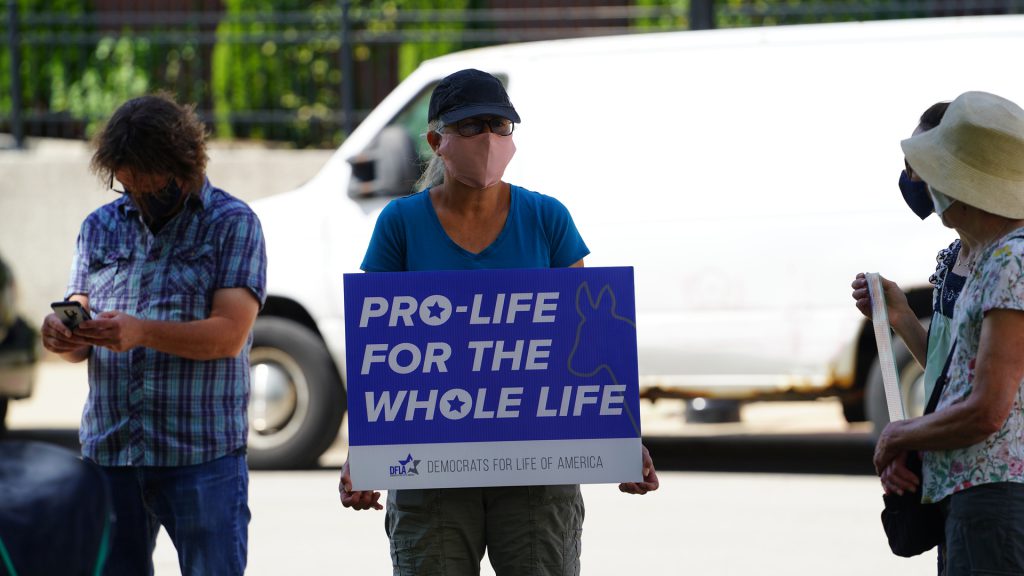
Published August 18, 2020
Late last week, more than 100 prominent pro-life Democrats signed a letter to the platform committee of the Democratic National Convention, imploring the party to moderate its extreme stance on abortion.
Several current and former Democratic politicians signed the letter, including Louisiana governor John Bel Edwards, Minnesota congressman Collin Peterson, and Illinois congressman Dan Lipinski, the last of whom was defeated in his March primary by a progressive challenger, who focused her campaign on Lipinski’s opposition to abortion.
According to the letter, the signatories consider themselves loyal members of the Democratic Party, citing their commitment to “the Democratic principles of equality, fairness, and democracy” and saying that they have committed their careers to advancing “Democratic ideals and policies.”
But they object to the party’s increasingly radical positions on abortion policy, which they call “radically out of line with public opinion.” The letter notes that, while most Democratic politicians support abortion on demand, about 80 percent of Americans don’t. The letter doesn’t mention another pertinent fact: According to Gallup, only 18 percent of Democrats support unlimited legal abortion.
“The 2016 Democratic Platform endorses taxpayer funding of abortion, opposed by a supermajority of the population,” they write. “The same platform endorses taxpayer funding of abortion in developing countries, opposed by three-fourths of voters.”
Similarly dire statistics indicate that the Democratic platform on abortion contradicts not only the views of the average American but also those of most Democrats. A 2018 survey from Marist/Knights of Columbus found that Democrats were almost evenly split on whether taxpayer dollars should fund abortion in the U.S., and in 2017, another poll found that nearly three-quarters of Democrats opposed taxpayer-funded abortion overseas.
It is not without reason, then, that the signatories warn their party about alienating voters. “In 389 out of 435 Congressional districts, a majority of voters support a ban on abortion after 20 weeks,” they point out. “When Democratic leaders support late-term abortion, they push many voters into the arms of the Republican Party. Many people holding pro-life views are single-issue voters.”
On that last point, surveys have shown for quite some time that not only are there plenty of pro-life, single-issue voters in the U.S., but also that those voters outnumber single-issue voters who consider themselves pro-choice. In other words, the intensity gap among these single-issue voters favors pro-life politicians.
The letter also argues that the party’s extreme stance contradicts its own stated values and “violates our commitment to inclusivity and diversity.” They note that about one-third of Democrats call themselves pro-life and argue that those voters must be respected and included.
But it’s clear that, on abortion, the extreme, left-wing voices have the party’s ear. Last summer, after decades of having supported conscience protections for pro-life Americans, then–primary candidate Joe Biden flipped and embraced eliminating the Hyde amendment, which currently forbids direct federal funding of elective abortion through Medicaid.
Meanwhile, Biden’s running mate, California senator Kamala Harris, is the most pro-abortion politician ever to appear on a presidential ticket. She is a co-sponsor of Democratic legislation that would invalidate nearly all state restrictions on abortions in the last three months of pregnancy, well after fetal viability. During her failed run for president, Harris vowed that her administration would institute a regime of “preclearance,” aiming to block any state pro-life law that her Justice Department deemed in violation of Roe v. Wade. In late 2018, she insinuated that a faithful Catholic judicial nominee was unfit to serve on the bench if he embraced his Church’s opposition to abortion.
In light of the radical positions of these two candidates, it seems rather unlikely that the party will acknowledge, let alone agree to, the requests made in this letter, which include “reintroducing the conscience language from 2000 into the 2020 platform” and avoiding “divisive policies, such as passing a law in Congress defining a right to abortion . . . and introducing taxpayer-funded abortion.”
Not to do so will be to its detriment. As the signatories note, many pro-life Democratic politicians come from purple districts or even red states, where a radical stance on abortion could be enough to doom a liberal candidate. With the ticket it will nominate this week, the Democratic Party has already said to those voters, in essence, “Take a hike.”
Alexandra DeSanctis is a staff writer for National Review and a visiting fellow at the Ethics and Public Policy Center.








